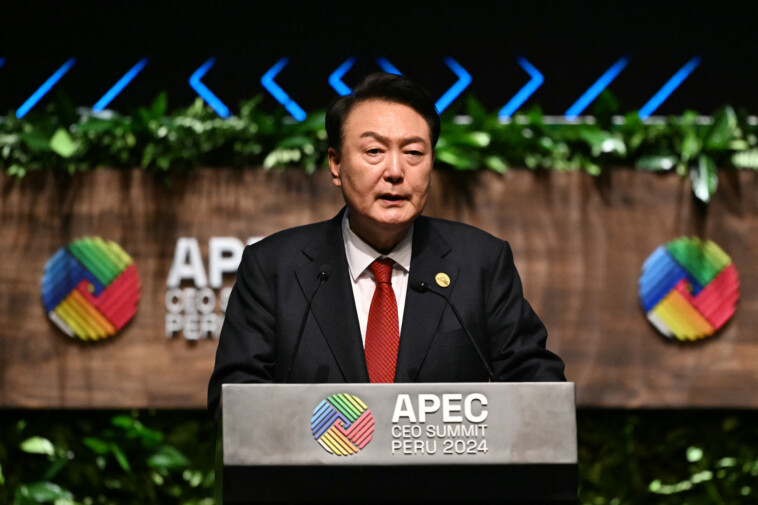South Korean President Yoon Suk Yeol’s dramatic decision to invoke martial law on Tuesday could end his leadership of the country after opposition leaders filed a motion to impeach him.
It’s a move that could also see him later face criminal charges and prison — if history is any guide.
Opposition leaders somberly posed with the motion in their announcement Wednesday,
Yoon abruptly imposed the emergency military crackdown late Tuesday night in a move meant to halt all activities of the parliament, which is led by the opposition South Korean Democratic Party
In a statement announcing the short-lived order, Yoon claimed the martial law was meant to combat North Korean influence and “anti-state” forces in the government.
His declaration was only in effect for roughly six hours, with the National Assembly unanimously voting to cancel the president’s order shortly after the declaration.
Yoon and his Cabinet later formally lifted the measure — as required by the Constitution when passed by a majority parliamentary vote — by 4:30 a.m. local time.
South Korean law requires that two-thirds of its parliament votes to impeach the president, plus the support of at least six justices on the Constitutional Court.
However, he would immediately lose his constitutional powers if the parliament passes the impeachment — at least until the Constitutional Court makes its ruling.
The motion, submitted by the Democratic Party and five other smaller opposition parties, could be put up for a vote by Friday.
“President Yoon Suk Yeol’s martial law declaration was a clear violation of the constitution. It didn’t abide by any requirements to declare it,” the Democratic Party said in a statement.
“His martial law declaration was originally invalid and a grave violation of the constitution. It was a grave act of rebellion and provides perfect grounds for his impeachment.”
South Korea has a long and troubled history with its leaders, with 12 former dictators and presidents prior to Yoon having been overthrown, investigated for crimes, impeached or threatened with impeachment, imprisoned, assassinated or sentenced to death since 1948.
The country last impeached a president in 2016, when then-President Park Guen-hye was removed from office after she was charged with bribery, abusing state power and leaking state secrets.
Park was later sentenced to 25 years in prison for her crimes, but was later pardoned in 2021 on “compassionate grounds” by then-President Moon Jae-in.
Prior to that, South Korean president Roh Moo-hyun was impeached in 2004, but faced no criminal prosecution.
He was suspended from his position for two months before the Constitutional Court returned him to power.
With a parliament of 300 members, it would require the votes of 200 politicians to affirm the impeachment.
With 192 members of opposition parties in parliament, the lawmakers would only have to convince eight members of Yoon’s party to pass the measure.
Already, there has been some indication that could be possible.
When the legislative body held an emergency session Tuesday to overturn Yoon’s martial law declaration, 18 lawmakers from Yoon’s People Power Party cast ballots supporting the rejection, National Assembly officials said.
Even People Power Party leader Han Dong-hun — who has a long history with Yoon dating back to their pre-politician days as prosecutors — cried out against Yoon’s martial law declaration, calling it “wrong” and “unconstitutional.”
Martial law had last been ordered in the country in the early 1980s during student unrest.
Prior to that, the liberty-revoking measure was used by a series of South Korean leaders to crack down on government protests before the country had its first democratic election in 1987.






